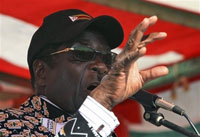Zimbabwe needs UN peacekeepers for new elections
Zimbabwe needs U.N. peacekeepers to help prepare the way for new elections, the country's opposition leader said in an opinion article published Wednesday.

Morgan Tsvangirai, holed up at the Dutch Embassy, has pulled out of a presidential runoff against President Robert Mugabe scheduled for Friday, saying attacks on his supporters by police, soldiers and governing party militants has made a free vote impossible.
Tsvangirai, leader of the Movement for Democratic Change opposition party, sought refuge at the embassy following the announcement Sunday of his withdrawal from the runoff after getting a tip soldiers were headed to his home.
"We ask for the U.N. to go further than its recent resolution condemning the violence in Zimbabwe," Tsvangirai wrote in the article published in British newspaper The Guardian. "We need a force to protect the people."
"We do not want armed conflict, but the people of Zimbabwe need the words of indignation from global leaders to be backed by the moral rectitude of military force," he said. "Such a force would be in the role of peacekeepers, not troublemakers. They would separate the people from their oppressors and cast the protective shield around the democratic process for which Zimbabwe yearns."
Mugabe, by all indications intent on extending his nearly three-decade rule, insists Friday's vote will go ahead. He has grown only more defiant in the face of growing international pressure.
On Wednesday, opposition officials said police raided one of their provincial offices. Scores of opposition activists, including high-ranking party members, have been attacked or killed. The MDC's No. 2 official has been jailed since earlier this month on treason charges - which can carry the death penalty.
Tsvangirai called Mugabe a "power-crazed despot holding his people hostage to his delusions, crushing the spirit of his country and casting the international community as fools."
His party said Tsvangirai would address reporters "on the way forward" later Wednesday, but did not say where the briefing would be held.
In The Guardian, Tsvangirai acknowledged calling for international intervention was sensitive, but said it would offer "the best chance the people of Zimbabwe would get to see their views recorded fairly and justly."
Regional heads of state, meanwhile, were meeting in Swaziland in hopes of finding a solution for Zimbabwe.
The Southern African Development Community meeting, though, did not include South African President Thabo Mbeki. He was appointed by the bloc more than a year ago to mediate between Mugabe and Tsvangirai, and in recent weeks has come under pressure to abandon his tactic of "quiet diplomacy."
Mbeki has refused to publicly denounce Mugabe even as other African leaders step up their criticism, saying confrontation could backfire.
Mbeki's spokesman said late Tuesday that Mbeki was not going to Swaziland because he is not a member of the security committee of the regional bloc, which called the meeting.
South African Deputy Foreign Minister Aziz Pahad told reporters that South Africa may yet send an envoy to neighboring Swaziland - the countries' capitals are a few hours drive apart.
Mediation efforts appear aimed at bringing Mugabe and Tsvangirai together in a coalition government.
Senegalese President Abdoulaye Wade, who has also been trying to broker an agreement, said Tuesday that Mbeki was trying to persuade Mugabe and Tsvangirai to share power in a transitional government with Mugabe as president and Tsvangirai as prime minister. Wade was also proposing that Tsvangirai take a position junior to Mugabe's, but not that the coalition be considered merely transitional.
Neither proposal appeared to have been embraced by the rivals. Tsvangirai has insisted he be president and Mugabe have no role.
Tsvangirai claim to leadership is based on his having come first in a field of four in the first round of presidential voting March 29, though he did not win the 50 percent plus one vote necessary to avoid a runoff.
Tsvangirai's party and its allies also won control of Parliament in the March voting - the first time since independence from Britain in 1980 that Mugabe's ZANU-PF party failed to win a parliamentary majority.
South African officials have offered no details of Mbeki's mediation agenda. Pahad rejected criticism.
"We can only say mediation fails if Zimbabwe gets totally engulfed in a state of civil war. It's not there yet," Pahad told reporters in South Africa's capital Wednesday. "There are three more days to go (before the vote) and the situation demands we do everything possible to get Zimbabweans to agree on the way forward."
Tsvangirai, who has called on Mbeki to step down as mediator, wrote in The Guardian that Mbeki's approach "sought to massage a defeated dictator rather than show him the door and prod him towards it."
He added: "We envision a more energetic and, indeed, activist strategy. Our proposal is one that aims to remove the often debilitating barriers of state sovereignty, which rests on a centuries-old foundation of the sanctity of governments, even those which have proven themselves illegitimate and decrepit."
Subscribe to Pravda.Ru Telegram channel, Facebook, RSS!


